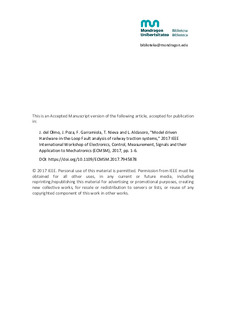
Título
Model driven Hardware-in-the-Loop Fault analysis of railway traction systemsFecha de publicación
2017Grupo de investigación
Accionamientos aplicados a la tracción y a la generación de energía eléctricaOtras instituciones
Construcciones y Auxiliar de Ferrocarriles (CAF)Versión
PostprintTipo de documento
Contribución a congresoContribución a congresoIdioma
InglésDerechos
© 2017 IEEEAcceso
Acceso abiertoVersión de la editorial
http://doi.org/10.1109/ECMSM.2017.7945878Publicado en
IEEE International Workshop of Electronics, Control, Measurement, Signals and their Application to Mechatronics (ECMSM) Donostia, San Sebastian. 24-26 May. Pp. 1-6. IEEE, 2017Editorial
IEEEPalabras clave
Analytical models
Mathematical model
Safety
Circuit faults ... [+]
Mathematical model
Safety
Circuit faults ... [+]
Analytical models
Mathematical model
Safety
Circuit faults
Rail transportation
Fault trees
Computational modeling [-]
Mathematical model
Safety
Circuit faults
Rail transportation
Fault trees
Computational modeling [-]
Resumen
Classical Dependability Analysis techniques, such as Failure Mode and Effects Analysis (FMEA) and Fault Tree Analysis, have been used during the last decades to demonstrate the reliability, availabili ... [+]
Classical Dependability Analysis techniques, such as Failure Mode and Effects Analysis (FMEA) and Fault Tree Analysis, have been used during the last decades to demonstrate the reliability, availability, maintainability and safety of industrial equipment. One of the main challenges that these techniques have to overcome is the complexity of current systems, in which more than one engineering domain is involved and many different subsystems interact. In order to facilitate the analysis of fault modes and their effects, some researches have proposed to use models as a tool to merge fault related information with structural and behavioural information. This kind of approach, also known as Model Based Analysis, pretends to develop extended models that can be shared by design and safety engineers. This paper is an example of Model Based Dependability Analysis and Fault Injection applied to a railway traction application. A Hardware-in-the-loop platform was built to inject faults in the model of the traction system and analyse the behaviour of the Traction Control Unit. As a case study, the effects of the faults in current sensors have been analysed. Phase current sensor faults were simulated and effects were identified using the platform. According to the preliminary FMEA and the experience of the technical support team, these faults are the most challenging ones in terms of detection and maintenance. The results show that a preliminary theoretical FMEA can be enhanced using the proposed model-based methodology. [-]
Colecciones
- Congresos - Ingeniería [436]




















